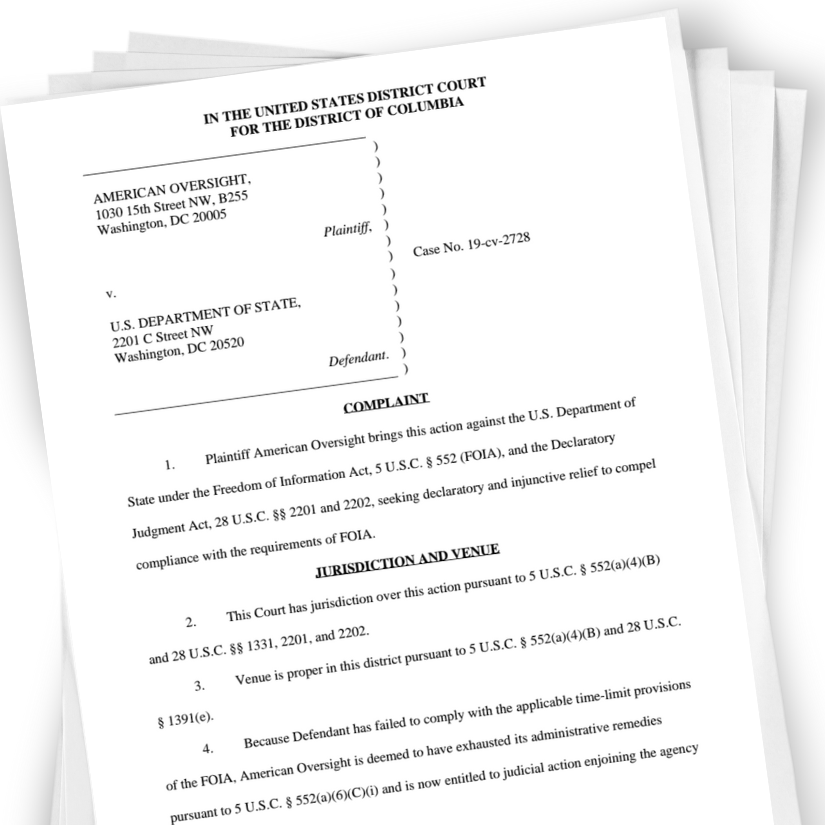
New Lawsuit Seeks State Department Records of Jared Kushner’s Middle East Trips
American Oversight sued the State Department for records related to Jared Kushner-led delegations and escalating U.S.-Iran tensions.

Today, American Oversight sued the State Department for records regarding the Trump administration’s Middle East policies, including Jared Kushner-led delegations to foreign countries as well as escalating U.S.-Iran tensions and the possibility of military conflict.
Kushner’s Role in Middle East Diplomacy
President Donald Trump’s son-in-law and adviser Jared Kushner has taken a lead role in handling Middle East policy issues, maintaining a notoriously close relationship with Saudi Crown Prince Mohammed bin Salman — even reportedly exchanging direct WhatsApp and text messages with the prince. Kushner has led several delegations to the region, ostensibly to advance a Middle East peace plan, the progress of which has repeatedly stalled. The trips included events in Israel, the United Arab Emirates and Saudi Arabia — all nations in which Kushner retains financial interests.
Few details about the delegations have been released to the public, but Kushner’s trips have, reportedly, at times sidelined overseas U.S. embassy staff, and have had apparently minimal State Department involvement besides the participation of Brian Hook, the special representative for Iran. (Hook recently made headlines for personally emailing captains of foreign vessels, offering large amounts of cash to persuade them not to work with Iran — an unusual role for such a senior official.) The delegations have relied heavily on White House Middle East envoy Jason Greenblatt, who this week announced his departure, and Kushner assistant Avi Berkowitz, who is expected to take on a larger role after Greenblatt’s exit.
American Oversight filed two Freedom of Information Act requests in April and July for communications — sent through both email and WhatsApp — from State officials during Kushner’s initial February delegation, as well as Hook’s WhatsApp messages and communications with Kushner, Berkowitz, and outside entities during four of this year’s delegations. The State Department’s failure to provide records in response to these requests prompted today’s lawsuit.
Rising Iran-U.S. Tensions
Iran-U.S. relations have grown increasingly tense in the past year and a half after the Trump administration unilaterally withdrew from the Iran nuclear deal, ratcheted up sanctions on Tehran, symbolically designated Iran’s Islamic Revolutionary Guard Corps as a foreign terrorist organization, and built up the U.S. military presence in the Middle East. This summer, multiple attacks on oil tankers near the Strait of Hormuz, Iran’s shooting down of a U.S. military surveillance drone, and its recent threat to begin enriching uranium to weapons-grade material have all highlighted the escalatory nature of the relationship.
Throughout this period, Trump administration figures — notably Secretary of State Mike Pompeo and senior State officials — have demurred in answering questions about whether the 2001 or 2002 Authorizations for Use of Military Force (AUMF) could be used to justify war against Iran. When asked by Congress to clarify the issue, the State Department caveated its response.
Despite the exit of one of Trump’s most hawkish advisers, National Security Adviser John Bolton, the same day that Pompeo said Trump may meet Iranian President Hassan Rouhani at the U.N. General Assembly this month, concerns remain that the administration, with its haphazard and volatile approach to foreign policy, could nevertheless have worked to lay the groundwork for unilaterally initiating conflict with Iran.
Today’s lawsuit also includes a May FOIA request submitted for records reflecting any legal analysis of whether the administration could take military action against Iran under the authority granted by the 2001 AUMF or whether specific congressional authorization would be required before engaging in conflict.
Saudi Arms Sales
In May, Pompeo sent a letter to the Senate Foreign Relations Committee saying “that an emergency exists” requiring the sale of arms to Saudi Arabia, the United Arab Emirates, and Jordan to “deter Iranian malign influence.” He also announced that the Trump administration would employ a little-used provision of the Arms Export Control Act to waive congressional review requirements for the sale.
The emergency declaration is particularly significant because it allows defense contractor Raytheon to partner with the Saudis to assemble sensitive weapons parts in Saudi Arabia, rather than in the U.S. as is traditionally done for national security reasons. During a closed-door briefing for Congress on Iran threats just three days before the emergency declaration, Pompeo and then-Acting Defense Secretary Patrick Shanahan did not mention the emergency, raising questions about whether the State Department purposefully concealed the plan from Congress.
Press reporting suggests that Charles Faulkner, the former acting assistant secretary and deputy assistant secretary for legislative affairs, may have played a lead role in crafting the emergency declaration approach before being reportedly pushed out of the State Department on May 10 because of his involvement in the effort. A former lobbyist for Raytheon, Faulkner had a history of advocating for arms sales during his tenure — including having encouraged Pompeo to certify that Saudi Arabia and the United Arab Emirates were taking steps to reduce civilian casualties in the Yemen war so as not to jeopardize future arms sales.
American Oversight submitted multiple FOIA requests to State seeking records related to the emergency declaration and Faulkner’s role, and today’s lawsuit includes requests for his ethics records and external communications with former clients and employers.
During a time of rising geopolitical uncertainty, the public needs to know whether and to what extent external influences are shaping U.S. foreign policy in the Middle East.
“President Trump and his closest advisers have consistently shown a willingness to place personal enrichment and political expediency over the interests of the American public,” said Austin Evers, American Oversight’s executive director. “Nowhere is this so dangerous as in matters of war and peace.”
The full complaint is below.